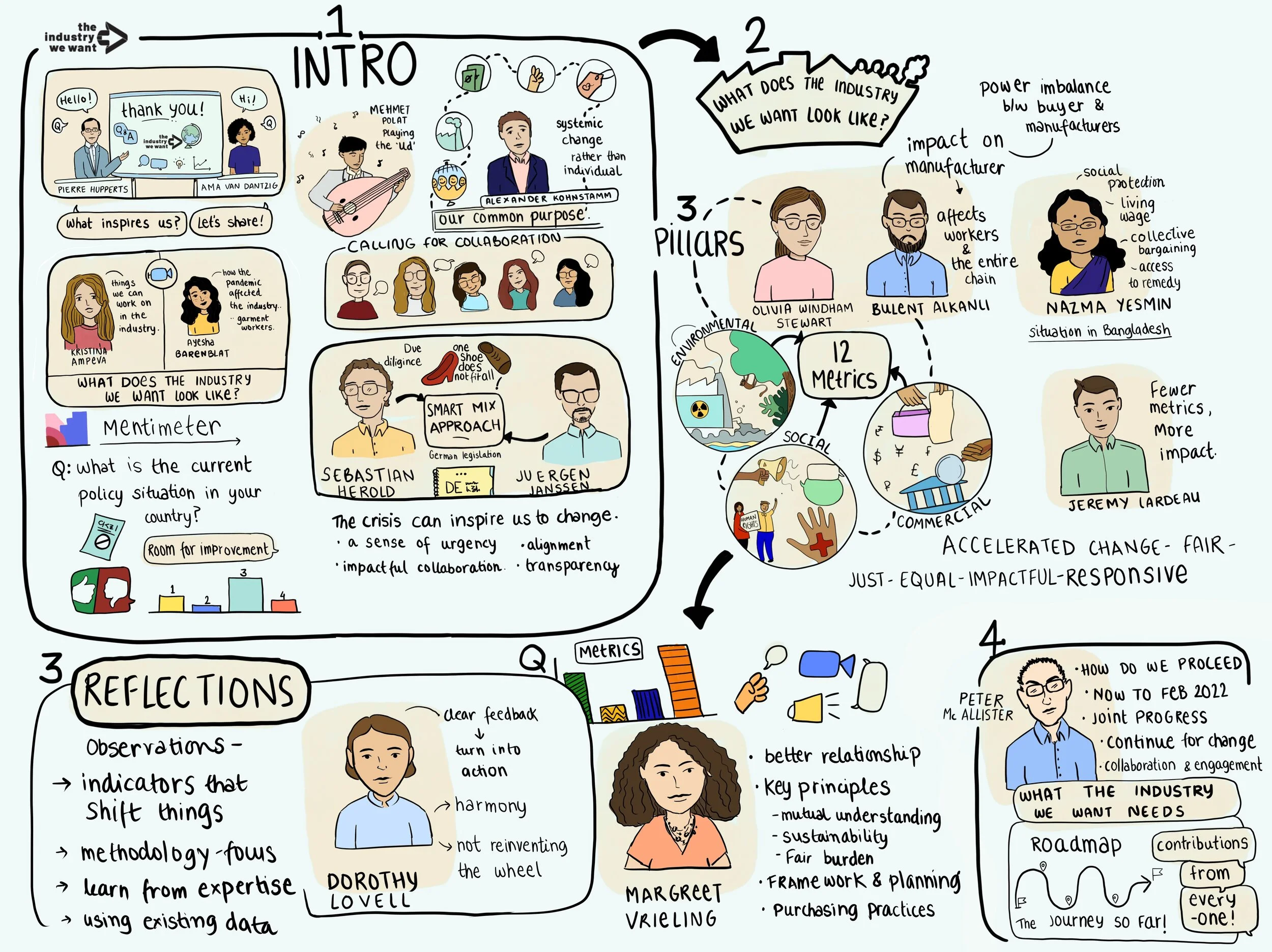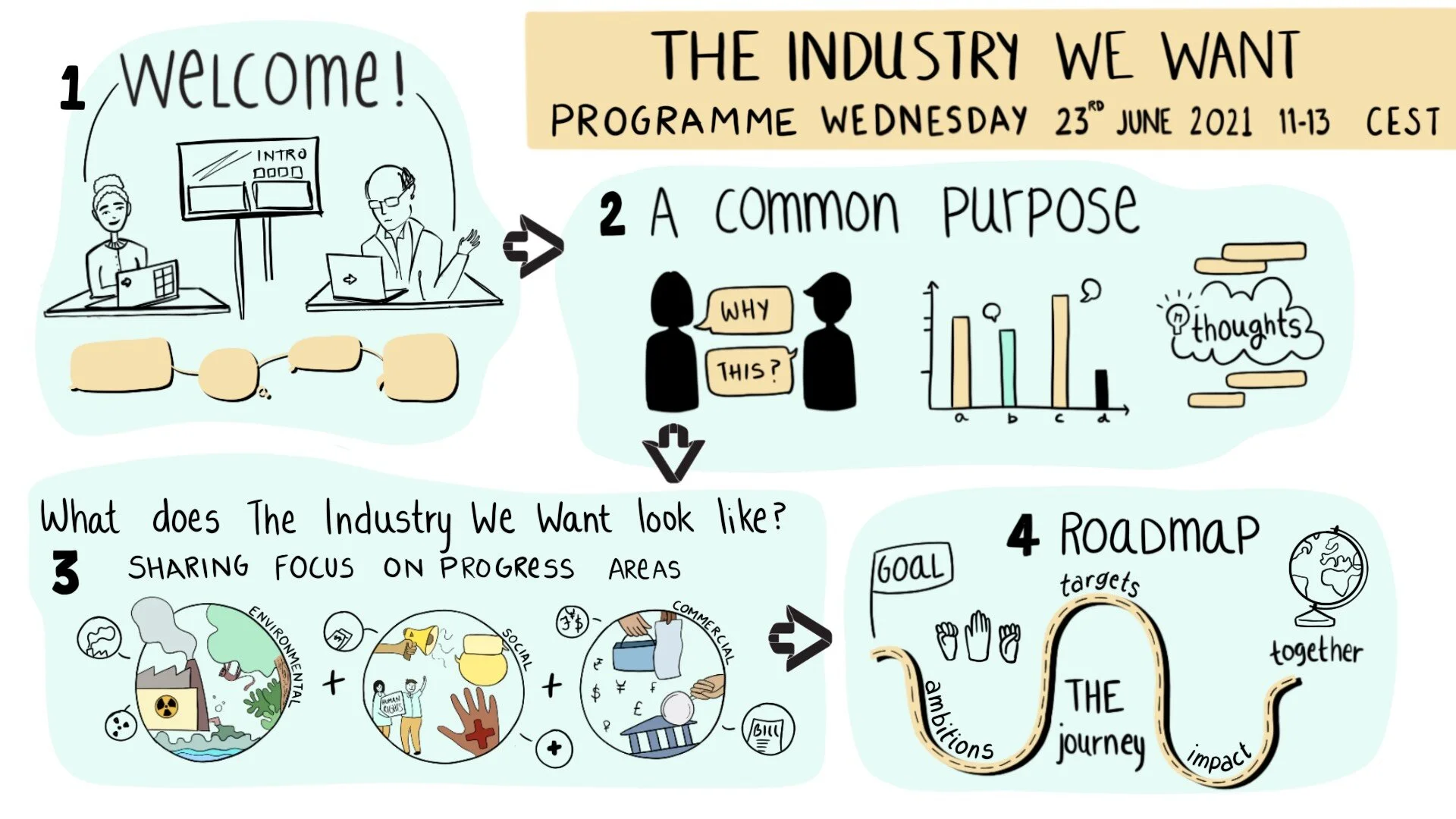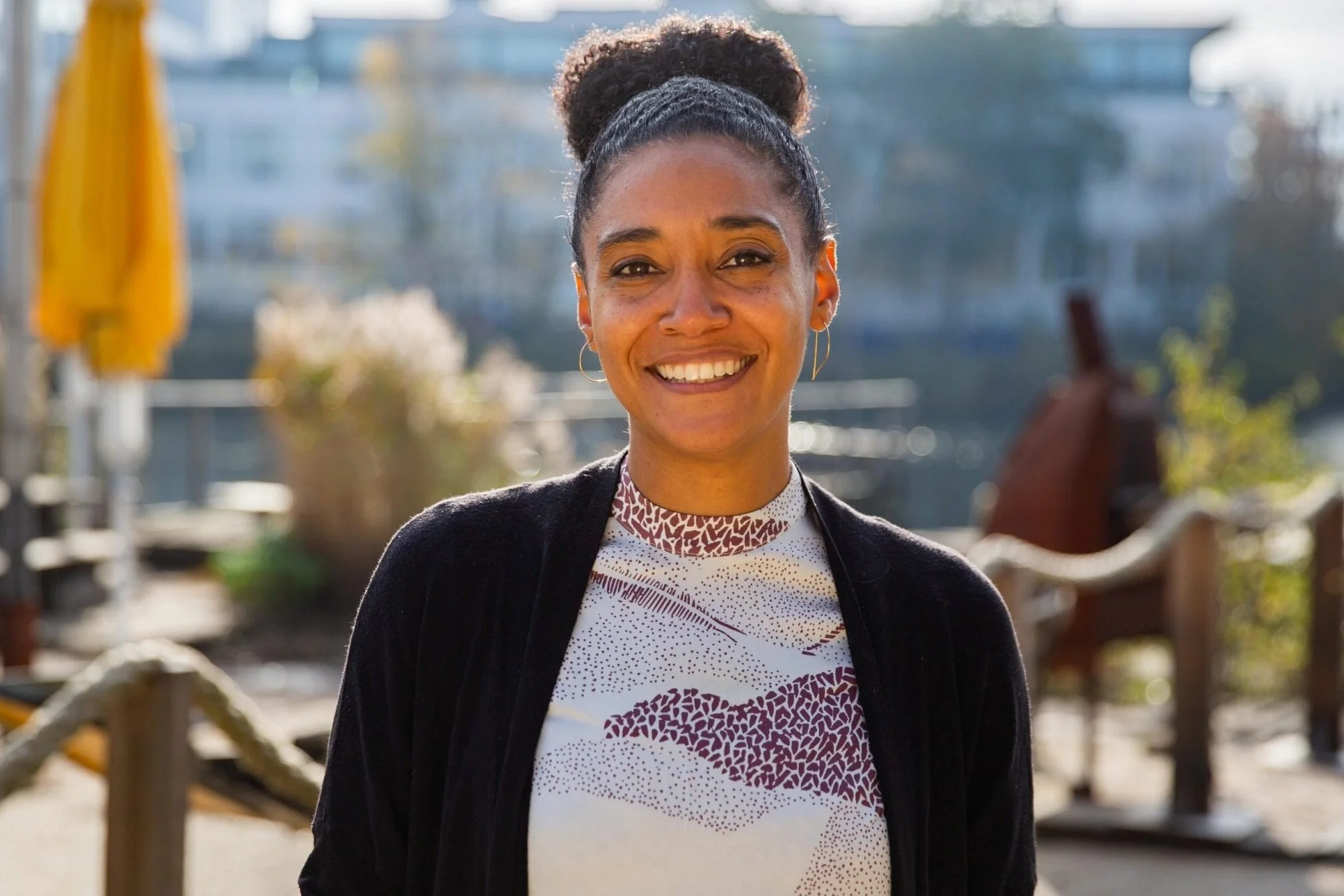Second event of The Industry We Want
On June 23, 270 people from 38 countries across the supply chain joined the second The Industry We Want event to explore how we can work together towards a just and regenerative garment and footwear industry. The event in June attracted many who are ready for action and we experienced a great willingness to connect and align to work towards environmental, social and commercial industry transformation. During the event, we presented progress and discussed key focus areas for accelerating change.
We invited stakeholders to share their feedback and ideas on our proposed focus areas to bolster meaningful collaboration for sustained impact. A range of stakeholders imagined and shared their vision of The Industry They Want during the event with us. Make sure to head to our cinema section to watch their vision of The Industry We Want and selected highlights of the event.
By Aayushi Yadav
Selected highlights
"The boat has been rocked; now we need to decide if we want to go back to old models or if it is time for change, collaboration? Many organisations are trying to use this window of opportunity for change."
— Juergen Janssen, GIZ
"The Industry I Want is one with a pleasant working atmosphere, a living wage, united workers in strong unions, respect for the laws and responsibility from fashion brands."
— Kristina Ampeva, Glasen Tekstilec
"You can't manage, what you can't measure. We don't have a good single source of reporting of the industries environmental footprint that would allow reporting to other stakeholders."
— Jeremy Lardeau, SAC
The event was covered by Fashion United, highlighting its key moments.
Focus areas
The dynamic and engaging event revealed our proposal for 12 industry-wide metrics across three pillars: social, environmental and commercial, devised in consultation with industry stakeholders.
After the kick-off event in January, we had many constructive conversations with a variety of key industry stakeholders. We held focus groups and one-to-one conversations with workers, suppliers and trade union representatives in Bangladesh, Vietnam, Bulgaria and North Macedonia.
Around 100 additional stakeholders joined six open-door working sessions to explore key areas and possibilities for measuring and driving progress. Together, we tackled difficult questions and even raised a few more along the way.
As a result of our collective efforts, we defined our focus areas, and started a journey to devise 12 key metrics and focus areas for environmental, social and commercial change in the garment and footwear industry.
During the next phase, we begin our work building industry-wide metrics in three priority areas: GHG emissions, wages and purchasing practices. If you would like to contribute to or collaborate on any of our priority indicators, share your ideas or data, please get in touch with us.
Meet the speakers
Sebastian Herold
Sebastian Herold is Senior Policy Officer, Sustainable textiles supply chains and sustainable consumption unit (121) at the Federal Ministry for Economic Cooperation and Development (BMZ), Germany. Responsibility within unit: Further development of the Green Button scheme (Grüner Knopf). He is a trained carpenter, studied social anthropology and worked as a journalist for a while. Sebastian worked for GIZ before joining BMZ in 2014.
Juergen Janssen
Juergen Janssen is Programme Director at GIZ and head of the office of the German Partnership for Sustainable Textiles since 2016. The Textile Partnership is a multi-stakeholder initiative with around 135 members aiming at improving the social, ecologic and economic conditions along the whole textile value chain by advancing the risk-based due diligence approach. Previously, Juergen was manager and representative of the German Global Compact Network for more than five years. Before that he worked in academia, market research and strategic consulting in and for various industries in Europe and Asia.
Ayesha Barenblat
Ayesha Barenblat is a Social Entrepreneur with a passion for building sustainable supply chains that respect people and our planet. With over 15 years of leadership to promote social justice and sustainability within the fashion industry, she founded Remake to mobilize citizens to demand a more just, transparent, and accountable fashion industry. Remake’s free educational resources, advocacy campaigns, and sustainable brands directory are focused on making fashion a force for good.
Dorothy Lovell
Dorothy Lovell is a Policy Advisor in the Centre for Responsible Business Conduct at the OECD, leading the OECD’s work on Due Diligence for Responsible Supply Chains in the Garment and Footwear Sector, where she has also contributed to reports on Blockchain and Responsible Supply Chains, and SMEs and Due Diligence, among others. Dorothy also has private sector experience working on responsible supply chains in the sector.
Meet the panelists
Nazma Yesmin
Nazma Yesmin is currently working as a Director of the Bangladesh Institute of Labour Studies-BILS, the only labour institute of Bangladesh which endeavors to uphold the rights of working people and trade unions. Ms. Yesmin is a leading women workers rights activist who is committed to overcoming challenges and barriers to the democratic and economic development of Bangladesh. She has been contributing to the advancement of women and workers’ rights for more than two decades.
Jeremy Lardeau
Jeremy Lardeau is the Vice President of the Higg Index at the SAC. As part of the leadership team, he oversees the strategic direction and development of the Higg Index suite of tools. Before joining the SAC team, Jeremy was Senior Director of Sustainability Analytics, at Nike, Inc. where he led sustainability reporting, performance management, data products, and reporting. Prior to Nike, Jeremy was a manager with PricewaterhouseCoopers’ sustainability practice, successively working out of the Paris, Mexico City, and San Francisco offices.
Bulent Alkanli
Bulent Alkanli is the Managing Director of Perseus Ltd, a sourcing office based in Istanbul working with European and American brands. He has been an elected board member of the Turkish Clothing Manufacturer’s Association between 2014 and 2021. Bulent is taking an active role in the working groups for Education and Sustainability. And he is participating in many panels and working groups to advance the working conditions of refugees and advocating equal rights for women in the industry.
Olivia Windham Stewart
Olivia Windham Stewart is an independent business and human rights specialist, working primarily in the garment and footwear industry. Olivia previously worked with the labour rights team at C&A Foundation (now Laudes Foundation), before which she was at Impactt UK. She is currently based in the UK.
Meet the hosts
Ama van Dantzig
An original thinker, Ama van Dantzig divides her time between Accra and Amsterdam - building bridges between seemingly opposite worlds. With vast experience on the ground in many countries and communities, she believes in the ability of people to generate ingenious solutions for the challenges of our time. Ama is the co-founder of Dr. Monk.
Pierre Hupperts
Pierre Hupperts is an expert in facilitating multi-stakeholder dialogues and processes in the garment, food, and mining industries. He is chair of the Dutch Agreement on Sustainable Garments and Textiles, as well as the former chair of the Social and Labor Convergence Program (SLCP), an initiative working to implement the first industry-wide framework to assess social and labour conditions in the garment industry.













